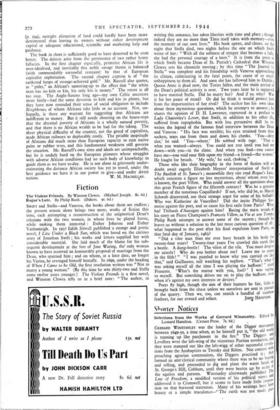Fiction
SWIFT and Stella—and Vanessa, the books about them are endless ; the present season alone brings two more, works of fiction this time, each attempting a reconstruction of the enigmatical Dean's relations with the two women, in whose lives he played havoc, while making them immortal : Esther Johnson and Esther Vanhomrigh. In i937 Edith ,Sitwell published a strange and poetic novel, I Live Under a Black Sun, which was based on the curious story of Jonathan Swift ' • his works and letters supplied her with considerable material. She laid much of the blame for his sub- sequent development at the feet of Jane Waring, the only woman known to have received an honourable proposal of marriage from the Dean, who spurned him ; and on whom, at a later date, no longer his Varina, he revenged himself brutally. In 1699, under the heading of When I Came to be Old, the first resolution written was "Not to marry a young woman." (By this time he was thirty-two and Stella some twelve years younger.) The Violent Friends is a first novel, and Winston Clewes tells us in a brief note: "The author, in writing this romance, has taken liberties with time and place ; though indeed they are no more than Time itself takes with memory--evea the memory of our own lives." His book opens, and/closes, on the
night that Stella died, two nights before the one on which Swift wrote of her : " With all the softness of temper that becomes a lady,
she had the personal courage of a hero." It is from the point at which Swift became Dean of St. Patrick's Cathedral that Winston Clewes sets his chronicle moving ; by this time " The Journal to Stella " was complete and his friendship with Vanessa approaching its climax, culminating in the fatal poem, the cause of so much unhappiness to them all. And soon she has followed him to Dublin; Queen Anne is dead now, the Tories fallen, and the main period of the Dean's political activity is over. Two years later he is supposed to have married Stella. Did he marry her? And if so, why? Was it for her peace of mind?. Or did he think it would protect him from the importunities of her rival? The author has his own ideas about these mysterious questions, which he attempts to answer ; he shares the opinion of D. H. Lawrence, expressed in a • preface to Lady Chatterley's Lover, that Swift, in addition to his other ills, suffered from rupophobia. But with less persuasive skill he re- writes the legend of the famous final interview between the Dean and Vanessa : " His face was terrible; his eyes strained from their sockets, tears ran -from them and down his cheeks. You—dirty slut,' he said. You—whore.' He sobbed with rage. That is what you wanted—always. You could not rest until you had me down—with you—in the slime. And when you find—you cannot have me—you void your filth upon my friend—a friend—the woman.' He fought for breath. `My wife,' he said, choking." Those who like their biography in the form of fiction will na doubt await eagerly Elizabeth Meyers' interpretation of Swift in The Basilisk of St. lames's ; meanwhile they can read Rogue's Lute, which concerns a figure no less mysterious, about. whom even less is known, the poet Villon. Who could answer all the questions about this great French figure of the fifteenth century? Was he a genuine member of the notorious Coquillards? If not, why did he, as Marcel Schwob discovered, use their strange argot for some of his ballads? Who was Katherine de Vaucelles? Did she incite Philippe Ser- moise against the poet, and so cause his first exile from Paris? Whit had Thibault d'Aussigny against him? Basing the main trends of his story on Pierre Champion's Francois Villon, sa Vie et son Temps. Philip Rush attempts to answer some of the secrets k; though he leaves us without a solution to the last most curious question of all: what happened to the poet after his final expulsion from Paris, on that fatal day of January, 1463? " Did a viler man than me ever have breath in his body for twenty-four years? Twenty-four years I've crawled this earth like a beetle. A dung-beetle! The vilest of the vile. You must despise me utterly! Why do you bother about me? Leave me to crawl . in the filth! " " I was puzzled to know why you carried on like that," said Guillaume, still watching his nephew. " That's what I was asking myself all the time I was playing the buffoon! " cried Francois. ' What's the matter with you, fool? ' I was saying to myself. But something drives me on to play the buffoon, even when it's against my own interests or desires." Poets fly high, though the aim of their hunters be fair, little is brought back from the chase unless we ourselves are sent in pursuit of the quarry. Then we, too, can snatch. a handful of rainbow feathers, for our reward and solace.


























 Previous page
Previous page